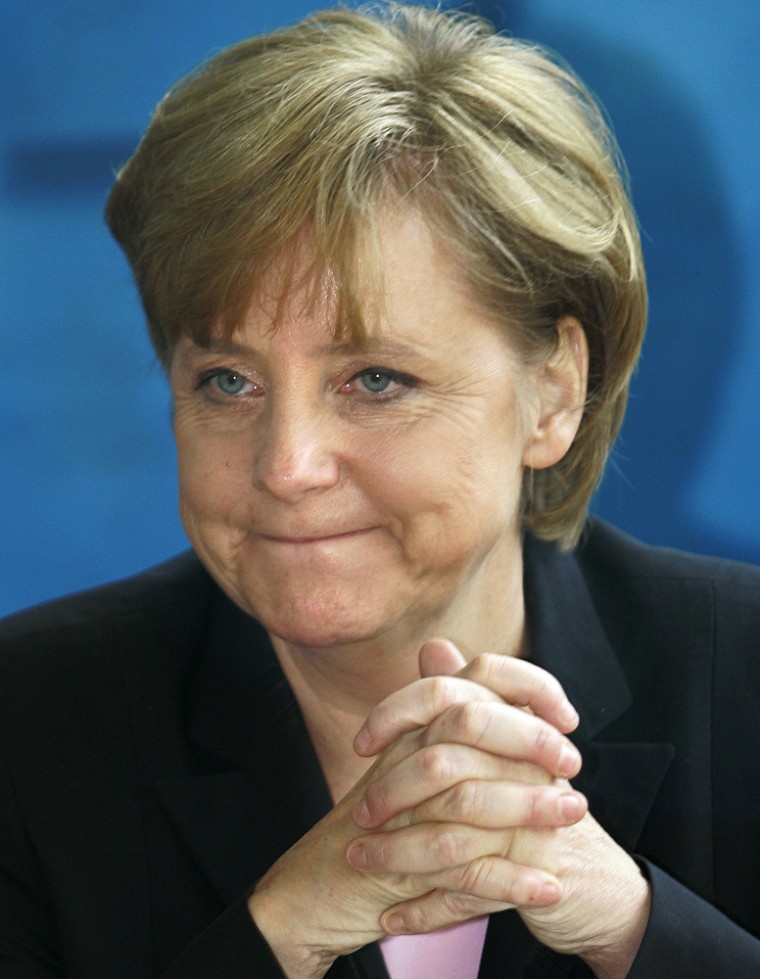Conservative leader Angela Merkel said Monday she had reached a “good and fair” deal that will make her Germany’s first female chancellor in a power-sharing agreement that would end Gerhard Schroeder’s seven years in office.
Under the agreement, which ends a three-week political deadlock, Merkel would have to give most of the seats in the new Cabinet to Schroeder’s Social Democrats as the price of governing, including top jobs such as foreign minister.
Merkel also said good relations with the United States — another possible sticking point with Schroeder’s party — would be a priority.
“I am convinced that good trans-Atlantic relations are an important task and that they are in Germany’s interests,” she said.
Merkel said the parties had agreed “there is no alternative to a reform course” for Germany, addressing fears that such a government will be so divided it can’t take tough action to address Germany’s problems with slow growth and high unemployment.
She didn’t trumpet her achievement in reaching the top job. “I feel good, but I have a lot of work ahead of me,” she said, referring to the coalition negotiations that will hammer out the details.
The talks should be completed by Nov. 12, she said, expressing confidence that her Christian Democratic Union would find agreement on a common foreign policy with the Social Democrats.
Germany’s leadership stalemate began when voters ousted Schroeder’s ruling coalition of Social Democrats and Greens on Sept. 18 but failed to give a majority to Merkel’s preferred center-right coalition. That forced the Social Democrats and her Christian Democrats to seek a power-sharing deal across the left-right divide.
Lived in East Germany
Merkel forced Schroeder to drop his demand to be chancellor, saying that as head of the party with the largest number of seats, the job belonged to her. She would be the first woman to lead Germany and the first person from the formerly communist east to hold the job.
But she would see her ability to push through her agenda to reform the economy limited by sharing extensive power with her labor-backed former opponents, the Social Democrats.
Under the terms of the agreement, the Social Democrats would head the foreign, finance, labor, justice, health, transport, environment and development ministries.
Merkel’s Christian Democrats and their Bavaria-only allies, the Christian Social Union, would get the defense, interior, agriculture, families and education portfolios. The CSU leader, Edmund Stoiber, would become economy minister. Other than that, officials did not say who would occupy which ministerial post.
It was not immediately clear if Schroeder would have any role in the new government.
Parliament must convene by Oct. 18 but is not obliged to vote immediately on a new chancellor if coalition talks are still ongoing.
Merkel’s forces have 226 votes in the 614-seat parliament, while the Social Democrats have 222. A coalition needs 308 seats for a majority.
Jobs, economic policies delayed
Many Social Democrats had indicated that they would find it hard to support Merkel without gaining an exceptionally favorable coalition deal in return.
The prolonged negotiations have delayed action on key issues such as high unemployment and slow growth. Merkel campaigned on pledges to shake up Germany’s highly regulated labor market and get the stagnant economy going again.
Schroeder’s party fought its way to a better-than-expected election result with pledges to protect the welfare state and workers’ rights, and insists that a new government must combine “renewal and social justice.”
In several rounds of exploratory talks, the two parties nevertheless identified several areas where they believe they can work together, including reforming Germany’s tangled federal system and shoring up the government’s overdrawn finances.
